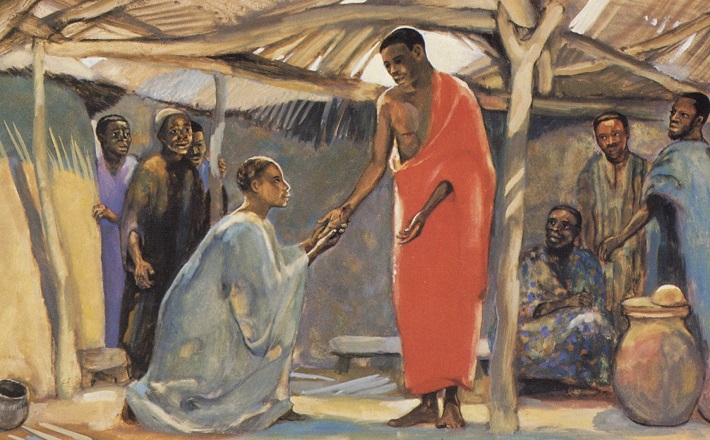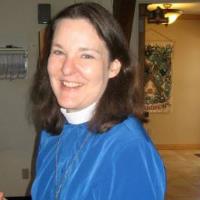Commentary on 1 Peter 1:3-9
The blessing at the beginning of 1 Peter overflows with joy and hope.
Like the thanksgivings that typically begin Paul’s letters, this Jewish-style blessing lays out the author’s main themes. Though many — perhaps even the majority — of the Christians in Asia Minor were resident aliens and visiting foreigners (see 1 Peter 1:1, 2:11), God has given them a new birth through Jesus’ resurrection and has made them members of God’s own household.
God has given them an inheritance and the honor that their society denies them. Even if they are suffering at the moment, they can trust that God is reliable and that their lives and their futures are in God’s hands. No matter how fiery the trials that their faith may endure, God can be counted on, not only to rescue them in the future, but to give them joy and hope in the midst of their suffering.
According to Acts, Jews from Cappadocia, Pontus and Asia were among those who heard Peter’s sermon on the Day of Pentecost (Acts 2:9; see 1 Peter 1:1), and it is likely that Christianity was brought to Asia Minor by these first converts. Many of the Christians in this region were Diaspora Jews who had come to believe that Jesus was the Messiah. Jewish Christians joined with Gentile Christians to form the Christian churches scattered throughout the geographically widespread and primarily rural Roman provinces in northeastern Asia Minor. Together they formed a diverse community different enough from their neighbors that the author of 1 Peter could refer to the whole group as “God’s chosen strangers” or “exiles” (1 Peter 1:1 CEB, NRSV).
As John Hall Elliott has demonstrated through careful study of the historical evidence from the first century, there was no empire-wide persecution of Christians at this point in history, nor was there systematic local governmental persecution of the believers living in the Roman provinces in Asia Minor to whom 1 Peter is addressed. Nevertheless, Christians who were not citizens — and this may well have been the majority of the Christians in this region — were vulnerable to abusive treatment by their neighbors and by local authorities. As resident aliens and visiting foreigners they were culturally and religiously different from the majority population. They paid taxes and contributed to the local economy, but they could not inherit property, and they were denied the legal protections that citizens enjoyed.
The difficulties faced by these ancient Christians were not so different from the suffering of immigrants and of people who practice a faith other than Christianity in the U.S. today. People who stand out because of their ethnic background or religious practices are often perceived as endangering the economic security and social wellbeing of the community. Undocumented immigrants — including those brought here as children who have lived almost their whole lives in the U.S., working, volunteering with civic organizations, serving their communities, and paying taxes — have few legal protections and cannot vote.
A Green Card, a Visa, or even citizenship, though they provide legal status, do little to protect against prejudice, ostracism, and various kinds of social and physical abuse. As recent news reports have reminded us, people who appear middle-Eastern or who practice another faith, especially Islam, are often denied service in restaurants and shops, publicly humiliated, verbally abused, and labeled “terrorists” without any evidence whatsoever. Since 9/11, Muslims and Sikhs have repeatedly been attacked, beaten, and in some instances killed because someone in their community perceived them as a threat to the good order and safety of the society. Whether they are immigrants or citizens, those who are religiously or ethnically in the minority tend to be seen as “other,” as “strangers,” as “not from here.”
It is to outsiders such as these that 1 Peter is written. God has given them the sense of belonging, the inheritance, and the honor that their society denies them. They have been reborn into God’s own family. Their neighbors may see them as worthless, but God sees the tested value of their faith as more precious than gold. Through the resurrection of Jesus, God has given them new life in the present and the promise of salvation and an eternal home when Jesus is revealed.
In the meantime, the in-between time, they live in hope. Such hope is not the mere wishful thinking that we express when we say, for example, “I hope everything goes well for you!” No, their hope is a firm confidence grounded in God’s character and God’s saving actions. By raising Jesus from the dead and by giving them new life, God has showed them who God is and what God can do.
Though they did not witness the resurrection of Jesus, and though even now they do not see him in the flesh, they know him and put their trust in him. This trust, this confidence in the One whom they have come to know and love, sustains them even when their society strips away everything else that might give them a sense of worth and a sense of place. Because God loves and protects and honors them, they can endure their neighbors’ scorn. More than that, they are brimful of joy over God’s life-giving power and lavish mercy. God’s actions in the past and God’s promises for the future have transformed their lives in the present.
The joyful blessing in 1 Peter continues to speak to Christians today who rejoice in the resurrection of the Christ whom we have never seen and yet love and trust. 1 Peter’s blessing resonates especially for Christians who feel ostracized or dishonored by their communities. Minority groups in every age know what it means to be excluded because of their ethnic identity or immigration status, but many Christians also know the shame and scorn heaped upon them because they do not fit social norms regarding economic status, sexual orientation, or gender identification. Perhaps they are unemployed. Perhaps their family of origin has rejected them, or they have left a dysfunctional family in order to preserve their own health and safety.
1 Peter has a message for those whom society rejects as well as for those who feel at home in society — perhaps even too at home. This blessing reminds us where our value lies. God loves and welcomes and honors us. Our worth comes not from human opinions, but from God who made us and who gives us new birth. Easter is not only about eternal life after we die. It is about the new life that God gives us in the present, in this world, in the here and now. Alleluia!


April 23, 2017